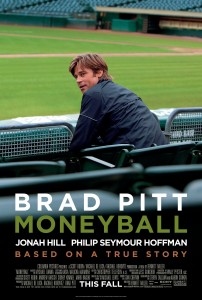 Today’s sports movies blend in with those from the past few decades, featuring an overly-dramatic storyline, a plot which features some sort of redemption, and a mix of mediocre acting and shabby directing.
Today’s sports movies blend in with those from the past few decades, featuring an overly-dramatic storyline, a plot which features some sort of redemption, and a mix of mediocre acting and shabby directing.
“Moneyball” doesn’t fall into that group.
Based on the 2003 book by Michael Lewis, “Moneyball” tells the (true) story of Oakland A’s General Manager Billy Beane (Brad Pitt) and his journey to build a championship-winning team while having the lowest payroll in baseball. Beane, with the help of his assistant GM Peter Brand, refocuses his organization on players who get on base more rather than the orthodox players with high averages or home run totals. Beane faces a monumental challenge which defies fundamental beliefs since he contradicts everyone in baseball, as well as his classic old scouts and the team’s manager (Phillip Seymour Hoffman).
However, “Moneyball” isn’t always focused on sports. It features inner battles Beane has with his personal life as well as his past as a baseball player. Beane’s intricate relationship with his daughter provides a very humane aspect to the movie, which casual and hardcore sports fans will appreciate alike. “Moneyball” is more about behind-the-scenes operations rather than the success of the team, which makes it a sports movie unlike any other.
I’m not going to lie, not every one of the 126 minutes is captivating, but that’s totally understandable in a psychological movie like this. While “Moneyball” had me bored during some early scenes, it started a rally with flashbacks to Beane’s playing days, keeping things interesting. “Moneyball” also brings in the closer, as it provides a lasting impact that had me leave the theater saying, “Wow.”
The movie’s dark tone is complemented and balanced well by the subtle humor provided by Brand’s social awkwardness in the movie. “Moneyball” takes you to a behind-the-scenes view of baseball’s front office, while the witty sarcasm by Beane’s scouts adds to the film, as their disproval of the new team is portrayed in a better light.
Brad Pitt, yet again, lives up to expectations, showing that he can tackle the tough role of the toughest job in all of sports. Pitt breaks out of his “pretty boy” shell and plays the role of a down-to-earth man. He gets viewers rallying with him as he goes around and takes stands for his beliefs. Beane’s discontent with his manger proves funny at times, which keeps the movie from being a big screen soap opera, and Beane from looking like an overly-stressed and overly-depressed man.
While Beane strives to challenge the fundamentals of building a baseball team, Jonah Hill has to challenge the fundamentals of his career. Hill, who plays the role of numbers-nerd Peter Brand, has to stray from his usual comedic roles and tackle the role of a socially awkward Yale graduate who looks to reinvent scouting and drafting. Hill comes out of the bullpen and provides a breath of fresh air in the movie. He is superb, showing that he can do more than crack jokes.
The directing, under Bennett Miller, was more than average. Miller intertwines footage from actual games with scenes which were acted out, providing a closer, more intense look at the players and games rather than just sticking with telecast coverage. At times I felt like I was on the verge of rooting for the A’s during the movie, hoping that they would win. Periods of time are split up, starting from the 2001 playoffs to the aftermath of the 2002 playoffs. Scenes of games are used sparingly, as the movie is constructed to keep from being just a highlight reel, such as many sports movies have done in the past. Miller also uses the concept of sound to his advantage, taking pauses in dramatic situations to let emotions sink in to the viewers.
What “The Social Network” was to the Web, “Moneyball” is to sports. It’s a must-see for sports fans, and a very enjoyable watch to those who have never been a baseball game. Definitely worth the money, and a sure-fire home run.
To see when “Moneyball” is playing at the Lake in the Hills AMC and other local theaters click here.
Post Author: Marek Makowski. Marek is the Sports Editor for The Voice. He is an avid White Sox fan, and also supports the Bears and Bulls. Marek aspires to transform his passion for journalism into a future career. He also reports for The Mash, a product of the Chicago Tribune. You can follow him on Twitter, @MarekMakowski.


Ryan • Sep 26, 2011 at 2:24 am
Good job on the story marek, I want to go see it now.